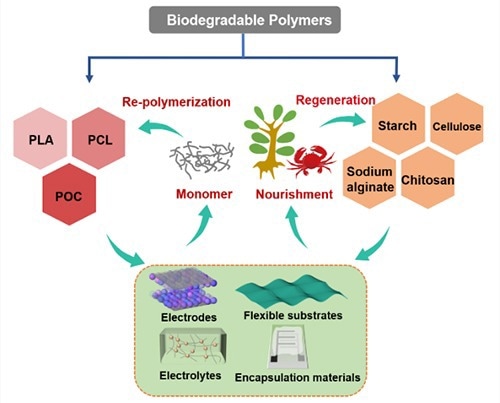Polymers are diverse materials, known for their outstanding flexibility and ease of processing. These characteristics have been suggested as a way to improve supercapacitor (SC) functionality, broadening their applications.
 Biodegradable polymers in supercapacitors and the recycling process. Image Credit: WU Lu.
Biodegradable polymers in supercapacitors and the recycling process. Image Credit: WU Lu.
The polymer materials typically used in SCs are not biodegradable, which could have adverse effects on the environment. Recently, a research group headed by Professor Zhong-Shuai Wu from the Dalian Institute of Chemical Physics (DICP) of the Chinese Academy of Sciences (CAS) verified the significance of biodegradable polymers, a key contributor to future green SCs.
Their review article was reported in Advanced Functional Materials on February 8th, 2023.
A green SC requires good biodegradability of different components to achieve harmless disposal in various environments. To meet these requirements, the device preparation must be highly dependent on the application of biodegradable polymers and innovative design strategies.
Zhong-Shuai Wu, Professor, Dalian Institute of Chemical Physics, Chinese Academy of Sciences
The research team outlined the classification of present biodegradable polymers and their normal properties, structure, and preparation processes, as well as the primary applications of biodegradable polymers in various components of SCs, such as electrolytes, electrodes, substrates, and encapsulation materials.
Also, they discussed the research advancement of biodegradable polymer-based SCs regarding preparation and modification methods and also the main role of biodegradable polymers in the green SCs’ development process.
Furthermore, they briefly suggested the future views and difficulties experienced by biodegradable polymer-based SCs.
Biodegradable polymers are the ideal raw material, and suitable research strategies and preparation methods are powerful means to the realize environment-friendly treatment of supercapacitors.
Zhong-Shuai Wu, Professor, Dalian Institute of Chemical Physics, Chinese Academy of Sciences
The above-performed study was financially supported by the National Natural Science Foundation of China and the China Postdoctoral Science Foundation.
Journal Reference:
Wu, L., et al. (2023) Recent Advancements and Perspectives of Biodegradable Polymers for Supercapacitors. Advanced Functional Materials. doi.org/10.1002/adfm.202211454.